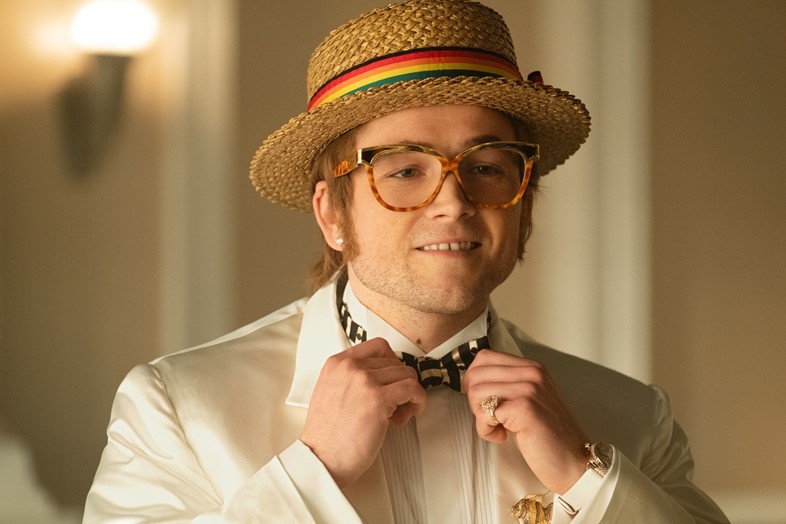As the film hits UK cinemas, director Dexter Fletcher discusses the making of his colourful and camp Elton John biopic
- TextThomas Curry
“I was extremely relieved to sit down to lunch with him and have him say, ‘Ask me anything you want’,” says Dexter Fletcher when I ask him what it was like when he first met with Elton John, the subject of his latest film, Rocketman. The biopic, which catalogues Elton’s meteoric rise to fame from the 60s to the early 90s, is a fantastical parade of colour, costumes and camp, punctuated with elaborate musical reveries that let the story drift into moments of dream-like wonder.
Written by Billy Elliot’s Lee Hall, Rocketman switches deftly between Elton’s phenomenal professional successes and often crushing personal lows, giving a new perspective on the life of a man many think they already know. It’s a surprisingly touching portrait, one which uses fictionalised retelling to capture real moments of honesty. “There are stories I delved into that he very generously shared, and didn’t seem to have any reservations at all about sharing,” says Fletcher.

The film explores Elton’s estrangement from his father, and navigates the singer’s complicated relationship with a mother who seems at once both supportive and, at times, completely disinterested in her son – a relationship that’s further complicated as Elton becomes the family’s primary source of financial stability. Perhaps the most captivating are those moments in the film where Elton struggles to come to terms with his identity as a gay man. On stage he can be flamboyant, outrageous, covered head-to-toe in feathers and rhinestones, but once the show is over he’s faced with the reality of a manager who recommends that he get a girlfriend (to reassure fans, to make him more palatable) and of a father that refuses to engage with his music. “There’s no doubt in my mind that when he goes and sees his dad, his dad has a problem with who he is,” says Fletcher. “His father never saw him play. Who doesn’t want their parents to be proud of them. [Elton] says ‘Maybe you’d like to come and see one of my concerts?’ And his dad replies, ‘It’s not really my sort of thing.’”
That struggle for acceptance, and the pressure of performing queerness without being allowed to openly acknowledge his same-sex attraction, could well be seen as the driving force behind Elton’s drug and alcohol abuse in the film. “I’ve no doubt it plays its part. Of course it does,” says Fletcher. “At that time, mid-70s, society was not really geared to being like ‘Oh, he’s gay.’ You had to tread carefully. You kind of understand that there would be some trepidation about society ostracising you.” This central conflict is perhaps most painfully articulated when Elton eventually comes out to his mother, who responds, coldly, “I hope you realise you’re choosing a life of being alone.” It’s a heartbreaking moment, and one of many which pulls back the curtain on the man behind the myth. “There is all this deeper psychological nuance which hopefully humanises that experience,” says Fletcher. “I’m trying to understand as much as I can about who he is as a person so that Taron and I and the film can give an honest representation of that.”
Was that always the aim? I ask. To encourage audiences to rethink what they know about Elton John? “I don’t know if I want to make them rethink him. I mean hopefully they can hear the music in a new way. I can’t claim to know what the exact reason behind each song or why it was written, all I do is use those songs when it’s appropriate to the emotional story that I’m telling about Elton and where he was at. I’m Still Standing, when you first hear it, you think it’s about someone bouncing back from a failed love affair, but when you apply it where we have in the film it takes on a whole new meaning.”
To dwell too much on these internal conflicts and psychological struggles, risks overlooking the genuine joy and whimsy captured in Rocketman. “The idea,” says Fletcher, “was to create something that would genuinely explode off the screen, a riotous joyride of imagination, celebration and drama”. At various points in the film, huge swarms of cast surge onto the screen for musical scenes that blend Broadway bravado with cinematic flair. It’s a visual and sonic spectacle that mimics Elton’s on-stage showmanship. “He lived, and lives his life without compromise,” says Fletcher, “he does what he does, he creates his music, he does his concerts, he loves what he has and what he does – there’s only one Elton John”.
Rocketman is in UK cinemas nationwide now.











